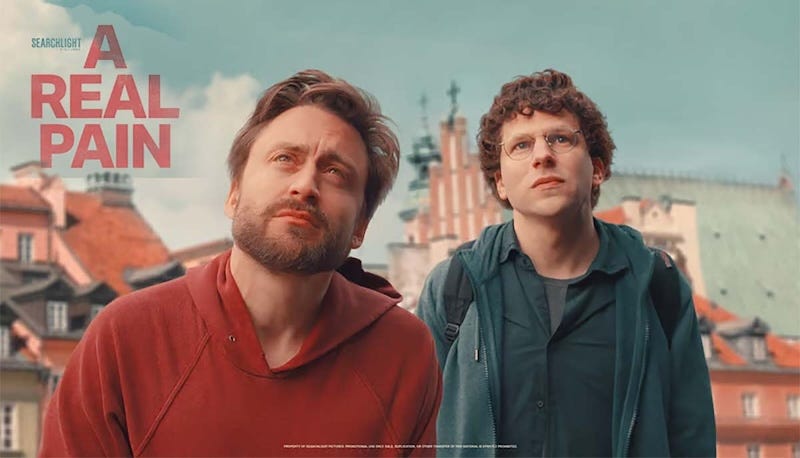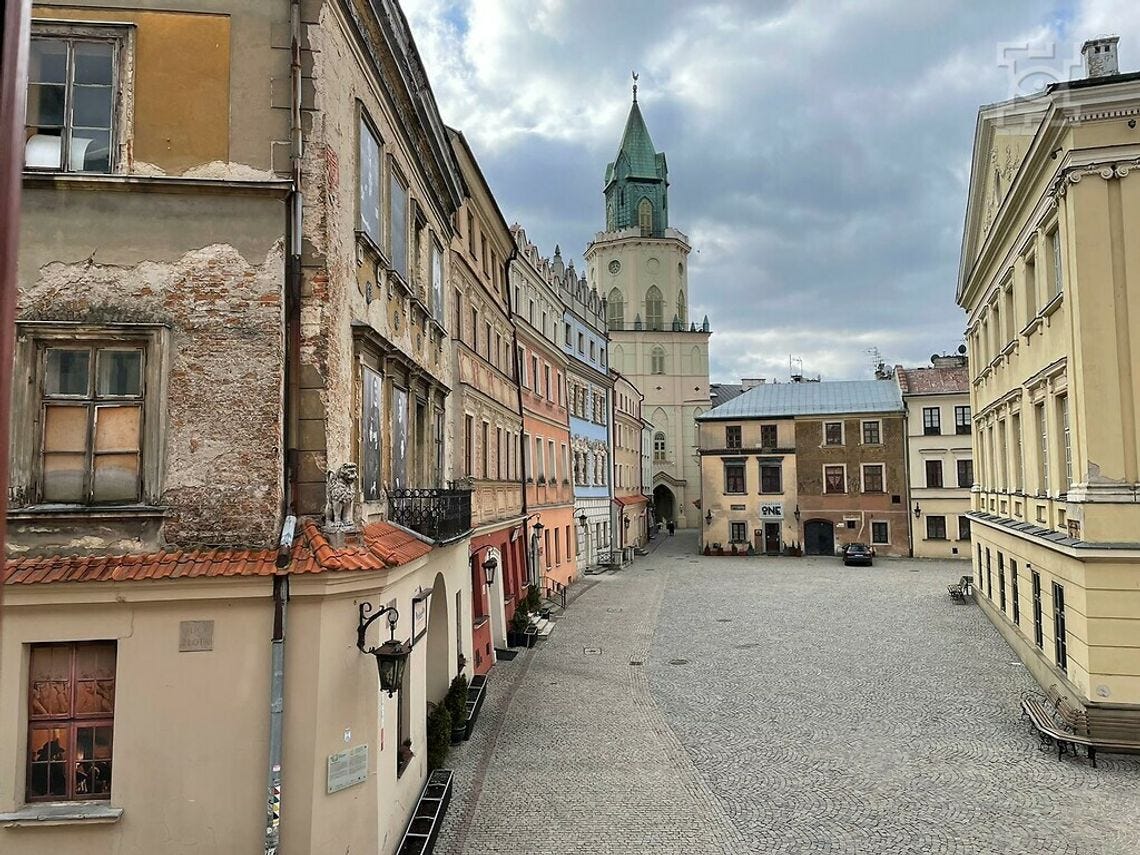A Real Pain
We're on a Holocaust Tour. If now is not the time to grieve, I don't know what to tell you.
Directed by Jesse Eisenberg
United States, 2024
Last year at ReidsonFilm we recorded a podcast reviewing The Zone of Interest, Jonathan Glazer’s film set in Auschwitz during the Holocaust. One of the questions raised was whether – and how – filmmakers should approach the subject of genocide. In A Real Pain, Jesse Eisenberg who writes, directs, and acts takes a very different approach. His film, a comedy, is in part about the Holocaust but is more concerned with how we respond to it today. The title could also be a question: set against the cataclysmic horrors of the last century what counts as real pain today? The grief of losing someone you love, the struggle of a challenging family dynamic, or bearing the generational pain of a lost future.
The film is set up as a road movie, with the focus on two cousins, David and Benji, travelling from New York to Poland to join a Jewish heritage tour. This is part of a plan to visit the childhood home of their recently deceased grandmother, Dory. A formidable woman, she was a Holocaust survivor who came to the US after the war. She didn’t speak about her life in Poland but left them the money in her will to make the trip.
David and Benji really are an odd couple. David is a seemingly settled digital ad salesman living in Brooklyn with his wife and child. He’s also a nest of neuroticism, too regularly popping pills for his OCD. In contrast Benji – there are just three weeks between them in age – is unemployed and lives in his mother’s basement, smoking a lot of weed. He may be the boy who never grew up, but he lights up every room he enters, people just warm to him, much to David’s thinly veiled irritation.
David: You can light up a room, then shit on everything in it.
Well, not always thinly veiled.
They join a group of Jewish tourists, all from the United States with one exception: Eloge (Kurt Egyiawan), a survivor of the Rwandan genocide who converted to Judaism after emigrating to Canada. The tour is led by the rather earnest but likeable James (Will Sharpe), an English historian. As a road movie A Real Pain doesn’t really work. The stops on the tour are too fleeting, though perhaps that’s the reality on a trip such as this. Really though, with the focus so much on David, Benji, and their relationship, the film works better as a buddy movie. Also, A Real Pain flies by, which is a shame as the tantalising glimpse we do get of the lives of the rest of the group leaves you wanting more. Unusually, this is film that could have benefited from a longer running time.
They say write what you know, and clearly Jesse Eisenberg knows of what he speaks here. Despite the humour – much of it laugh out loud – this a quiet film, a chamber piece fittingly accompanied by the nocturnes and études of Chopin. Both leads give strikingly expressive performances: Kieran Culkin, the most obvious as the impulsive, disinhibited, yet hyper-perceptive Benji. His patter is punctuated by ‘Dude!’, ‘Chill!’, and ‘Sweet!’, and yet he manages to easily connect with the very people you, and his cousin, expect him to alienate. Given the opportunity he’ll spend the evening in a pall of pot smoke, perhaps aiming to suppress an inner turmoil that surfaces when the group are at dinner. Eisenberg’s portrayal, in comparison, is muted, but no less complex – the smallest shifts in facial expression speak volumes.
The rich colour palette of Lublin risks sending the film into travelogue territory. But when the group arrives in the old Jewish quarter, once home to a busy, bustling community, the director makes a subtle change in rhythm and tone. The dialogue falls away, except for James’s minimal commentary. Little needs to be said as they arrive at Madjanek, the concentration and extermination camp sited just two miles from the centre of town. Back on the train, the group sit in silence, still. Only Benji can be heard, inconsolable, sobbing into his hands.
The comedy quietly reemerges when David and Benji leave the tour to visit the old housing block where their grandmother once lived. They lay two small stones on her former doorstep as a token of memory and respect, only to be harangued by a neighbour. He orders them to remove the stones as they present a tripping hazard. All of this has to be translated by the neighbour’s English-speaking son. A ridiculous moment but also poignant: negotiating the past, no matter the context, can be just as awkward, full of its own absurdities.
Reids’ Results (out of 100)
C - 68
T - 74
N - 72
S - 70
Thank you for reading Reids on Film. If you enjoyed our review please share with a friend and do leave a comment.
For another two friends on a road movie of sorts, do take a look at our review of Gus Van Sant’s Gerry:
Coming next… 28 Days Later(2002)









I loved this. I went to Lublin a few years ago and went to Madjanek. They captured the atmosphere perfectly. Everyone should visit one of these camps.
Watched it yesterday - yes it is the equivalent of a chamber music concert - 70 looks right